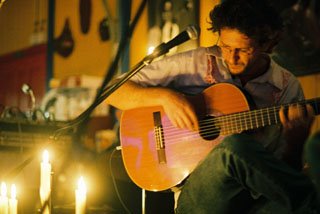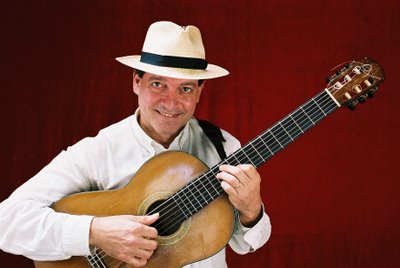5 November in De Muiderpoorttheater
www.muiderpoorttheater.nl
Datum: Zondag 5 november
Aanvang: 20.30 uur
Toegangsprijs: € 8,- reductieprijs € 6,-
Reserveren: 020 - 668 1313

English
Specialized on cavaquinho and acoustic guitar, Nelson Latif comes from the generation of Sao Paulo musicians of the eighties. With a background based on the styles of choro and jazz music, Latif has developed a unique approach towards playing the guitar.
Nelson Latif merges techniques of the classical guitar with the musical influences assimilated during his career. His melodic phrasing was strongly influenced by bebop and the syncopated Brazilian rhythms. Also the virtuosity found in the flamenco way of playing the guitar forms a strong part of Latif´s style.
Latif started his studies at the age of fourteen. Already at seventeen he was accompanying singers in the Sao Paulo nightlife. At this time, he had won a competition of a music school and he was awarded a scholarship to study conducting and composition at the Faculdade Santa Marcelina. Afterwards, he continued his classical guitar studies at the Faculdade Paulista de Musica.
At the beginning of the 80´s, Latif joined several groups in his hometown. Two of these groups were a strong influence to his musical development: the Quarteto Paulista, a choro group formed by some of the best Sao Paulo musicians and a flamenco duo with guitarist Julio Ramires. Also during this period, Latif studied electric guitar with Mozart Mello and improvisation with Paulo Belinatti.
In 1988, after a tour in Europe with the choro trio Remelexo, Latif moved to Lisbon, where he started giving workshops at the Juventude musical Portuguesa and teaching classical guitar at the well-known Escola de Guitarra de Duarte Costa.
In 1989 Latif moved to Amsterdam, where he lived for twelve years. During this time he was a member of Uit de Kunst, a Dutch governmental organization created to promote the foreign culture in Holland. Latif also continued his career as a musician playing with several important names of the Dutch jazz scene. Among others, saxophonists Paul Stoker and Michael Moore, and the singers Josee Koning and Lilian Vieira. During this time, Latif also traveled through many countries with Brazilian musicians playing at jazz and world music festivals. He also started working at recording studios
During the 90th, Latif started performing on the cavaquinho, an instrument that has became his trademark since then.
Between 1997 and 2000 he leaded the group Raiz Latina, touring many times through the Asian continent. They recorded their debut album in Seoul with the well-known Korean singer Kim Jun.
Nelson Latif came back to Brazil in 2001, when he formed Trio Baru with the musicians Fernando Corbal and Bosco Oliveira.
He recorded the CD Brazilian Portrait together with the saxophonist Flávio Sandoval in 2003, and started promoting this album in Brazil and Europe. At this same year he went several times to Suriname to play concerts and give workshops and lectures. Together with the guitarists Stanley Noordpool and Robby Faverey he played at the Carifesta and the Groen Festival.
In 2004, Latif formed a duo with the multi-instrumentalist Carlinhos Antunes. In 2005 he joined forces with the Ustad Zamir Khan, sitar and tabla player and a member of the legendary family of Indian musicians. Latif and Khan merged the traditional music of their countries, discovering a whole new world of musical possibilities. Also in 2005, Latif recorded the CD Choro, Samba e Afins, together with Dutch guitarist Joeri de Graaf. This recording was the starting point to the Choramundo Project, gathering musicians from Holland, Suriname and Brazil.
Since 2002 Nelson Latif has been organizing the Alma Brasileira Project for Brazilian embassies, universities and cultural institutions. The project is formed by workshops, concerts and a lecture; exposing a wide range of the traditional Brazilian music
Nelson Latif is also a sociologist graduated by the University of São Paulo.
Nederlands
Nelson Latif is virtuoos op de akoestische gitaar en de “cavaquinho”, een klein, ukelele-achtig Braziliaans snaarinstrument. Hij is van de generatie musici van de jaren ‘80 van São Paulo. In zijn muzikale opleiding lag het accent op de typisch Braziliaanse “choro” en de jazz. In de loop der tijd heeft hij een unieke eigen stijl op de gitaar ontwikkeld, met de techniek van de klassieke gitaar en de vele invloeden die hij in de loop van zijn carrière heeft opgepikt.Zijn melodische lijnen zijn sterk beïnvloed door bebop en de Braziliaanse syncopische ritmes. Maar ook de virtuoze techniek van de flamenco is een belangrijk deel van de stijl van Latif.
Latif begon op zijn veertiende gitaar te studeren, en op zijn zeventiende werkte hij al in het nachtleven van São Paulo als begeleider van zangers en zangeressen. In die periode won hij een prijs in de competitie die een muziekschool had georganiseerd, en won daardoor een beurs om aan de Faculteit Santa Marcelina voor dirigent en componist te studeren. Begin jaren ’80 speelde Latif met diverse groepen in São Paulo. Twee van deze groepen zijn van grote betekenis geweest voor zijn muzikale ontwikkeling: Het Quarteto Paulista, een chorogroep, bestaande uit enkele van de beste musici van São Paulo, en een flamenco duo dat hij vormde samen met de gitarist Julio Ramires. In deze zelfde periode studeerde Latif ook elektrische gitaar bij Mozart Mello en improvisatie bij Paulo Belinatti.
In 1988, na een tournee door Europa met het chorotrio Remelexo, verhuisde Latif naar Lissabon. Daar gaf hij workshops aan de Juventude Musical Portuguêsa Escola de Guitarra en doceerde hij klassieke gitaar aan de bekende Gitaarschool van Duarte Costa. In 1989 verhuisde Latif naar Amsterdam, waar hij 12 jaar heeft gewoond. Gedurende deze periode nam hij deel aan “Uit de Kunst”, een Nederlandse culturele overheidsorganisatie die de verspreiding van vreemde culturen in Nederland beoogt. Ook speelde Latif regelmatig met diverse grote namen uit de Nederlandse jazzscene, zoals de saxofonisten Paul Stocker en Michael Moore, en de zangeressen Josee Koning en Lilian Vieira. In deze periode maakt Latif ook diverse tournees door vele landen met Braziliaanse musici, en treedt hij op op vele Jazz- en Wereldmuziekfestivals. Ook werkte hij als studiomuzikant.
In de jaren ‘90 is Latif begonnen op te treden met de “cavaquinho”, die sedertdien zijn handelsmerk is geworden.
Van 1997 tot 2000 was hij leider van de groep Raiz Latina, waarmee hij veelvuldig tournees heeft gemaakt door Azië. Hun eerste album werd opgenomen in Seoel met medewerking van de bekende Koreaanse zanger Kim Jun. In 2001 kwam Nelson Latif weer terug naar Brazilië, waar hij het Trio Baru vormde, samen met Fernando Corbal en Bosco Oliveira.
Samen met de saxofonist Flávio Sandoval nam hij in 2003 de CD “Brazilian Portrait” op, en trad hij op in Brazilië en Europa ter promotie van dit album. In datzelfde jaar ging hij diverse keren naar Suriname om daar concerten te geven, en workshops en lezingen. Samen met de gitaristen Stanley Noordpool en Robby Faverey speelde hij op het Carifesta en het Groenfestival. In 2004 vormde Latif een duo met de multi-instrumentalist Carlinhos Antunes. In 2005 ging hij samenwerken met Ustad Zamir Khan, lid van een legendarische Indiase muzikale familie en sitar en tablaspeler. Latif en Khan lieten de muzikale tradities van hun beider landen samenvloeien, en openden daarmee een hele nieuwe wereld aan muzikale mogelijkheden. Ook in 2005 nam Latif de CD “Choro, Samba e Afins” op, samen met de Nederlandse gitarist Joeri de Graaf. Deze CD was de start van het Choramundoproject, waarin musici uit Nederland, Suriname en Brazilië samenwerken.
Sinds 2002 organiseert Nelson Latif het project “Alma Brasileira” (Ziel van Brazilië) voor Braziliaanse ambassades, universiteiten en culturele instellingen. Het project bestaat uit workshops, concerten en een lezing waarbij een breed scala van traditionele Braziliaanse muziek wordt belicht.
Tenslotte: Nelson Latif is als socioloog afgestudeerd aan de Universiteit van São Paulo.
Rogerio Bicudo
Rogério Bicudo (1957) started to play the guitar when he was very young , more precisely at eight years of age, and became professional when he was twelve years old playing mainly popular music. His passion for the instrument only increased, what lead hem to study in the Villa-Lobos Music School in Rio de Janeiro and later study classical guitar with Odair Assad.
In 1982 he moved to Spain where he studied at the Real Conservatório of Madrid with masters followers of Andrés Segovia, and also participated in courses of Baroque and Renaissance music. In 1987, year from the commemoration of the centennial of the birth of Heitor Villa-Lobos, he played in several European cities under the auspices of the Brazilian Embassy.
In that same year he moved to Holland where he recorded the LP "Chorinhos Brasileiros e Fuga". Since then he performs in Brazil, Europe and Mexico. In its presentations as soloist R. Bicudo performs besides the classical repertoire, also a repertoire of Choros and Waltzes.
In 1990 he founded in Amsterdam the quartet Choro Combinado, of instrumental acoustic formation - chamber music style: guitar, double bas, clarinet and violin - the group valued still more the harmonic drawings, standing out the magnificent melody of classics of the choro.
Choro Combinado recorded two Cd's in Holland, the first 'Sonoroso' in 1999 was distributed in the Europe, United States and Japan, and 'Curare' recorded in 2001, in this second Cd the identity of the quartet is already well defined and besides the interpretation of works of big Brazilian composers the group present us with beautiful own compositions within the styles choros waltzes and songs. Rogério Bicudo exploits all the lyricism and richness from the musical essence of the Brazilian 'school' of guitar in their interpretations, guitarist of a unique virtuosity pleasing all those that appreciate the good Brazilian instrumental music.
